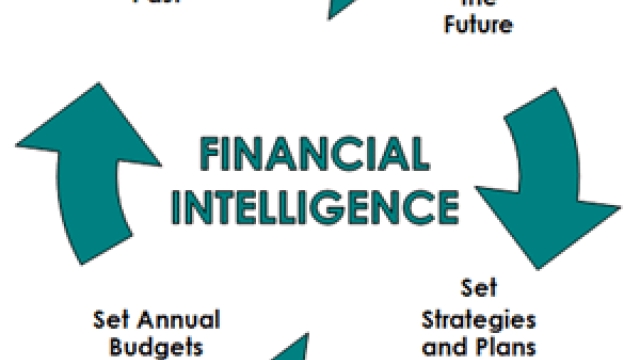Welcome to a journey towards achieving financial intelligence and unlocking the doors to prosperity! In today’s rapidly changing global market, possessing a strong understanding of financial intelligence has become more crucial than ever. This insightful article aims to guide you on the path to mastering this invaluable skill, empowering you to make informed decisions, manage your wealth effectively, and seize opportunities that pave the way towards a prosperous future.
Financial intelligence is the ability to comprehend and utilize financial information to make sound financial decisions. It goes beyond merely acquiring knowledge about money; it involves analyzing markets, assessing risks, and developing strategies to optimize financial resources. By honing this skill, you will gain the confidence to navigate the intricate world of finance and take control of your financial well-being.
Throughout this article, we will explore key principles, strategies, and tools that will empower you to enhance your financial intelligence. You will learn to decipher complex financial jargon, understand the intricacies of investments, budget effectively, and develop a long-term financial plan. With each step, you will uncover practical techniques and gain insights that will pave the way for financial success.
Whether you are a seasoned investor or just starting to dip your toes into the world of personal finance, this article will equip you with the knowledge and tools necessary to take charge of your financial future. Get ready to unlock the secrets of financial intelligence and embark on a journey towards prosperity. Let’s dive in!
Understanding Financial Intelligence
Financial intelligence is a key skill that empowers individuals to make informed and strategic decisions about their money. It involves a deep understanding of various financial concepts, such as budgeting, investing, and managing debt. By mastering the art of financial intelligence, individuals can unlock their path to prosperity and build a solid foundation for their financial future.
One aspect of financial intelligence is the ability to effectively manage personal finances. This includes creating and sticking to a budget, tracking expenses, and prioritizing financial goals. By understanding where our money is going and making conscious choices about how we spend and save, we can take control of our financial well-being.
Another component of financial intelligence is investment literacy. This involves understanding different investment options, such as stocks, bonds, and real estate, and making informed decisions based on risk tolerance and financial goals. By developing this knowledge, individuals can potentially grow their wealth over time and create a more secure financial future.
Furthermore, financial intelligence encompasses the skill of managing debt wisely. This involves understanding the impact of borrowing, interest rates, and repayment strategies. By managing debt effectively, individuals can avoid excessive financial burdens and utilize debt as a tool for growth rather than a hindrance.
In conclusion, financial intelligence is a crucial skill for individuals seeking to achieve prosperity and long-term financial stability. By understanding and applying concepts related to personal finance, investments, and debt management, individuals can make informed decisions and develop strategies that pave the way to a financially secure future.
Developing Sound Financial Habits
Forex
Prioritize Saving and Investing
Developing sound financial habits begins with prioritizing saving and investing. Setting aside a portion of your income each month towards savings is crucial for building a strong financial foundation. Whether it’s for short-term emergencies or long-term goals, having a habit of regularly saving and investing can provide you with a sense of financial security and open up opportunities for growth.Track and Budget Your Expenses
Understanding where your money goes is essential for maintaining control over your finances. Tracking and budgeting your expenses allows you to identify areas where you may be overspending and make necessary adjustments. By creating a clear budget and sticking to it, you can ensure that your income aligns with your financial goals and prevent unnecessary debt.Educate Yourself on Financial Matters
Developing sound financial habits also involves gaining knowledge about personal finance. Take the time to educate yourself on topics such as budgeting, investing, debt management, and retirement planning. Learning about these subjects will empower you to make informed decisions and navigate the complexities of the financial world. There are numerous resources available, from books and online courses to financial advisors, that can provide valuable insights and guidance.
Remember, developing sound financial habits takes time and consistency. By prioritizing saving and investing, tracking and budgeting your expenses, and educating yourself on financial matters, you can pave the way towards a brighter financial future.
Strategies for Building Wealth
Save and Invest
Saving money is the foundation of building wealth. By consistently setting aside a portion of your income each month, you create a financial safety net and the opportunity for investment. Investing your savings allows you to grow your wealth over time through various investment vehicles such as stocks, bonds, and real estate. Remember, the key is to start early and stay consistent with both saving and investing.Diversify Your Portfolio
A crucial strategy for building wealth is diversifying your investment portfolio. Spreading your investments across different asset classes and sectors can help minimize risk and maximize potential returns. Consider investing in stocks, mutual funds, bonds, and real estate properties. Additionally, explore different industries or sectors to avoid over-reliance on a single investment vehicle.Focus on Continuous Learning
Expanding your financial intelligence is an ongoing process. Make it a habit to regularly educate yourself about personal finance, investments, and the global economy. Stay informed about market trends, emerging technologies, and industry developments. Attend seminars, read books, listen to podcasts, and follow reputable financial experts to enhance your understanding of how money works. Continuous learning will empower you to make informed financial decisions and adapt to a changing economic landscape.
Remember, building wealth is a journey that requires discipline, patience, and a long-term perspective. Implementing these strategies can help you unlock your path to prosperity and ultimately achieve your financial goals.


